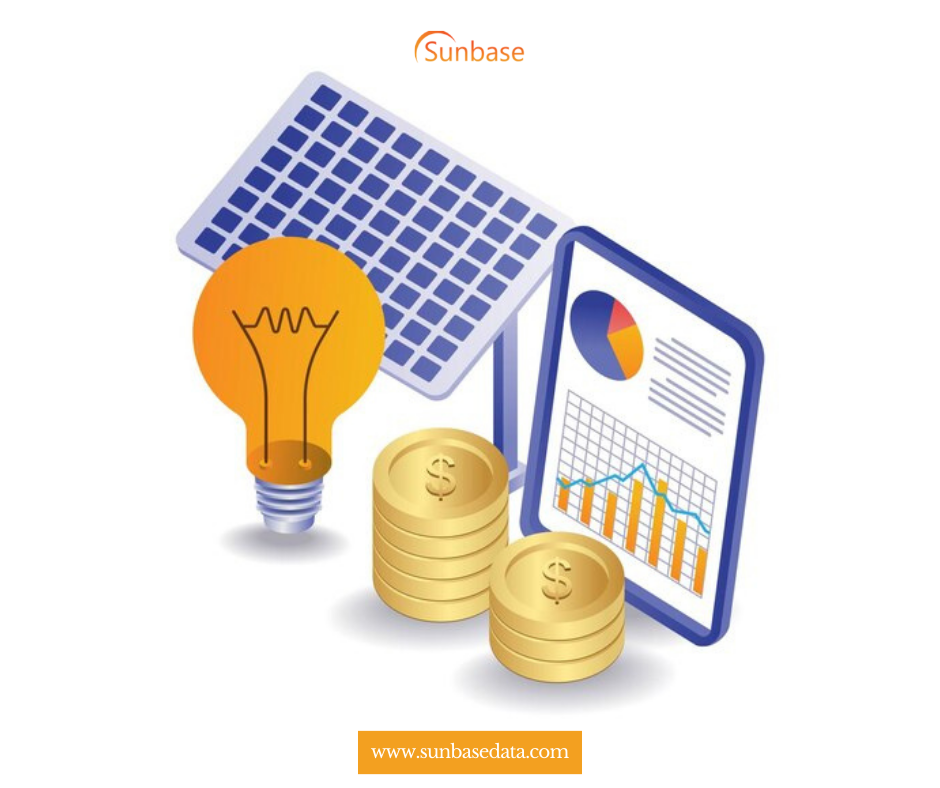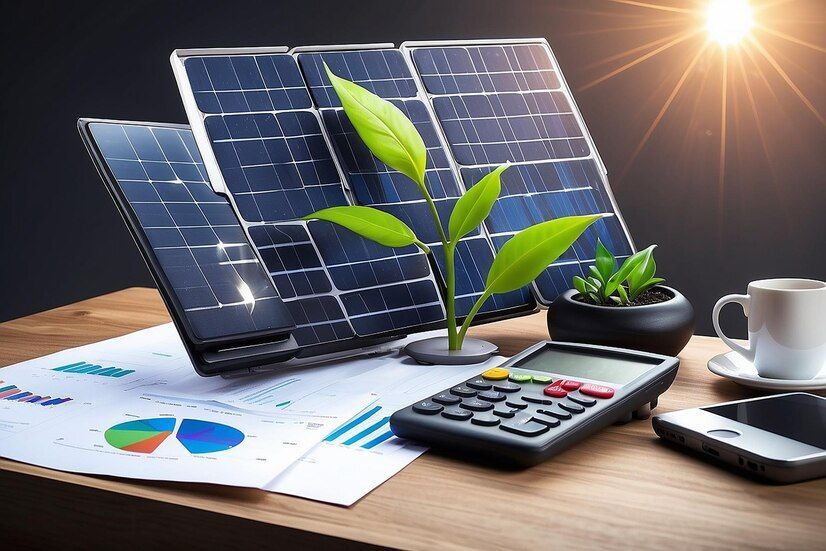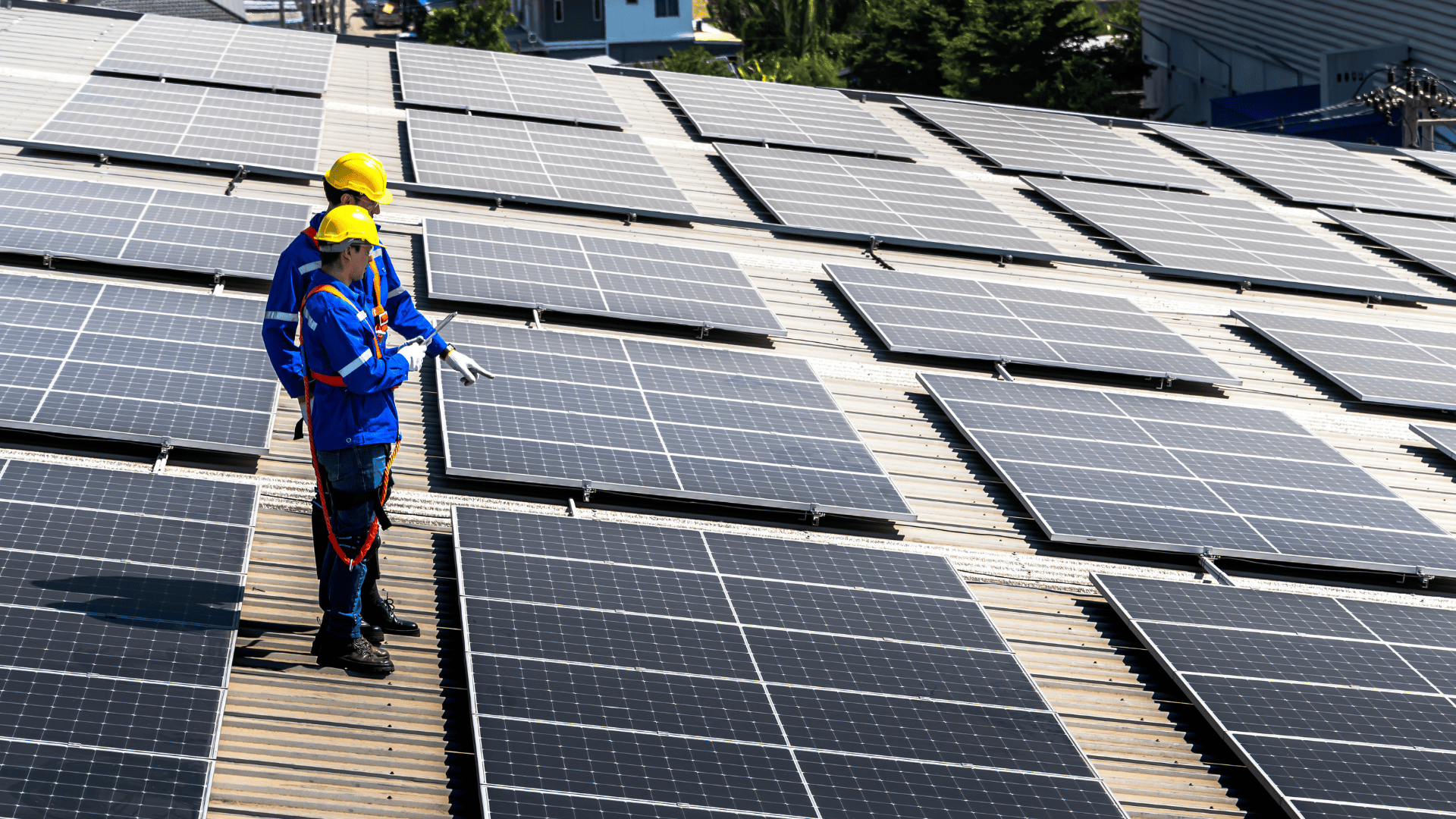May 16, 2024
The solar industry is growing rapidly due to rising global demand for renewable energy sources and declining technology costs.
According to the Solar Energy Industries Association (SEIA), solar power share of total US electricity generation has grown from 0.1% in 2010 to over 5% today, due to its increasing competitiveness with other technologies.
For solar companies, maintaining a balance between sustainability and profitability is a major problem as the solar market grows. In this article, we will explore the complex relationship that exists between sustainability and profitability in the solar sector.
Sustainability in the Solar Industry:

According to the National Renewable Energy Laboratory (NREL), solar energy costs have decreased, making it more competitive with fossil fuels, with global installations expected to reach 590 GWdc by 2027.
The solar sector has committed to sustainability and achieved great results as a result of its efforts. Some of them are:
1. Reducing environmental footprint in manufacturing
Prioritizing sustainable solar manufacturing has the potential to boost a company's reputation, lower regulatory risk, and better resource management.
It draws environmentally conscientious investors and homeowners, reduces regulatory issues, and lowers costs by using resources like clean energy and materials more effectively.
2. Commitment to resource efficiency and recycling
The solar industry promotes sustainability through optimizing material utilization, lowering waste, and introducing recycling solar systems. This encourages a circular economy, reduces waste going to landfills, and helps save resources.
Additionally, this improves brand recognition for solar power enterprises and helps in meeting regulatory requirements.
3. Access to government incentives and subsidies
Solar companies that prioritize sustainability can be eligible for government programs and subsidies, including tax credits and low-interest loans, which can help balance the costs of R&D, marketing, and customer acquisition, facilitating them to invest in new technologies and drive renewable energy growth.
It will open the door to a more promising future in which efficiency and sustainability go hand in hand, fueling development, innovation, and the creation of a cleaner, more sustainable future.
Profitability in the Solar Industry:
While sustainability plays an important role in the planet's ecological stability, profitability is necessary for corporate survival and growth.
1. Technological advancements and cost reductions
The solar industry is now more profitable and more competitive with fossil fuels as a result of innovations in technology and cost reductions.

The affordability of solar panels has increased demand, resulting in economies of scale and additional cost reductions, ultimately leading to higher profitability.
2. Ability to attract investors and secure funding
Solar companies have to look for investors and find funds to finance projects and expand operations. Due to their impressive financial results and promising future growth, they can draw in investors from the institutional, private equity, and venture capital markets.
This allows them to raise money for new initiatives, build their business, improve energy efficiency, and spend on research and development.
3. Financial stability and growth opportunities
To maintain operations, make R&D investments, and support a low-carbon economy, solar enterprises need growth prospects and financial stability.
Long-term sustainability and success are ensured by their stability, which enables businesses to invest in new technologies, extend their product lines, and enter new markets while enduring fluctuations in the solar market.
Solar enterprises may enhance their long-term sustainability and facilitate the wider adoption of solar energy while considering profitability side by side.
What strategies can be used to maximize profit in solar while staying sustainable?
Companies have to meet the significant challenge of striking a balance between sustainability and profitability as the solar industry continues to flourish.
Ecological and social responsibility demands that the goal of maximal profitability remain balanced. Her are some strategies to achieve this balance:
1. Investing in research and development for more efficient technologies
To maximize profit while maintaining sustainability, the solar business must invest in research and development. As more productive and cost-effective technologies are developed, solar energy will become more competitive with fossil fuels.

Using solar energy to produce electricity is a viable and sustainable strategy for supplying energy. Installing solar panels can provide large returns on investment while lowering carbon emissions.
Businesses can spend money on R&D to increase solar panel efficiency, energy storage, and smart grid integration, which would lower the levelized cost of electricity and boost adoption rates. Through innovation and sustainability, this strategy keeps the solar industry ahead of the curve.
2. Implementing cost-saving measures in production and installation processes
To cut expenses, businesses can apply lean manufacturing strategies, minimize material waste, and improve their manufacturing processes.
Furthermore, labor costs can be decreased and quality can be raised by optimizing installation procedures, utilizing cutting-edge technologies like AI and drones, and teaching installers how to work more productively.
Solar enterprises may preserve sustainability and boost their profit margins by putting these cost-cutting strategies into practice.
3. Developing long-term sustainability goals and metrics for tracking progress
To ensure sustainability and optimize profit, the solar business must establish long-term sustainability goals and criteria for monitoring progress.
Businesses can do life cycle evaluations, report on their environmental, social, and governance (ESG) performance, and set science-based targets.
Setting specific sustainability targets and measuring progress allows solar companies to discover areas for improvement, decrease their environmental footprint, and demonstrate their commitment to stakeholders.
These methods ensure that the solar sector can strike a balance between profit and sustainability, resulting in long-term profitability.
The Future of the Solar Industry
The solar sector has emerged as a source of optimism for a sustainable future as the world struggles with issues such as energy security, environmental degradation, and climate change.
As solar energy has become more affordable over time, it has become a more attractive alternative for countries and sectors looking to move toward alternatives to fossil fuels.
1. Increasing adoption of solar power worldwide
With the growing global acceptance of solar electricity, the solar business has a promising future. Solar energy is growing more and more attractive as a solution for both nations and businesses as costs decline and technology advances.

Understanding solar costs is essential for household and commercial consumers to make informed decisions about using solar energy. In addition to lowering energy costs, residential solar installations may support a sustainable future for homeowners.
Example: Many people are switching to different types of solar energy systems such as solar water heating systems that can offer hot water while consuming less energy and having less expenditure and rooftop solar panels that can transform unused roof areas into a profitable and renewable energy source.
Governments are aiming high for renewable energy, and solar energy is positioned to be a major contributor to achieving these targets.
2. Expansion of utility-scale solar projects
The importance of utility-scale solar installations is rising along with the need for renewable energy. These large-scale projects can generate vast amounts of electricity, making them an excellent option for utilities and governments seeking to achieve renewable energy requirements.
Utility-scale solar projects are getting more efficient and economical as costs come down, which makes them an essential component of the solar industry's future.
Utility-scale solar project expansion will be greatly accelerated by the Inflation Reduction Act, paving the way for a more sustainable and clean energy future.
3. Solar software and its role in optimizing operations
The role of solar software in streamlining operations within the solar business is becoming more significant. Solar software helps save costs and boost efficiency by enabling remote monitoring and control of solar panels.
Solar companies can identify possible problems before they become major issues thanks to advanced data analytics and automated preventative maintenance.
Solar software will be crucial in assisting businesses to improve their processes and remain competitive as the solar industry expands.
As the solar industry expands and evolves, it must adopt new technologies, strategies, and business models that prioritize sustainable development while driving economic growth.
Sunbase Solar Software to Ensure Efficient and Sustainable Project Execution
Sunbase is an all-in-one solar software platform made to assist solar industry professionals in effectively managing and expanding their businesses. Its noteworthy features include:
Project Management
With this software, prospects can manage solar projects from planning and installation through upkeep and repair. It gives real-time updates, tracks progress, and simplifies workflows.
Solar CRM
This software functions as a customer relationship management tool, allowing users to track leads, manage customer interactions, and evaluate sales performance. It facilitates finding fresh prospects and cultivating strong client relationships.
Proposal and Estimation
Users can efficiently and easily make customized proposals, estimates, and invoices using Sunbase's proposal and estimating tool. This tool enables solar specialists to offer their services professionally, boosting the possibilities of landing prospective contracts.
Solar Design
Sunbase's solar design uses modern technologies to plan and visualize photovoltaic systems. To provide the best possible system performance and efficiency, this feature assists users in creating precise and efficient designs.
Monitoring and maintenance
Users may track and monitor solar panel performance, spot possible problems, and plan maintenance tasks with Sunbase's monitoring and maintenance feature. This characteristic guarantees optimal efficiency of solar systems and increases their durability.
Reporting and Analysis
Sunbase's analytics and reporting tool offers up-to-date information on client preferences, sales, and project performance. This assists solar industry professionals in identifying areas for improvement, making data-driven decisions, and optimizing their business operations.
With the help of these capabilities, Sunbase offers a comprehensive solar software solution that guarantees sustainable and effective project execution, assisting solar experts in streamlining their operations, enhancing customer satisfaction, and fostering business expansion.
In a nutshell
The ability of the solar business to successfully find a balance between sustainability and profitability will determine its future. Solar enterprises can increase revenues while reducing their environmental effect by implementing innovative technologies, efficient business structures, and sustainable practices.
For the solar industry to fulfill rising energy demands while reducing climate change and promoting energy security, a delicate balance is necessary for long-term success.
The solar industry's legacy and global influence will ultimately depend on its capacity to strike a balance between sustainability and profitability.
About Sunbase
Take your solar company to the next level with the help of Sunbase's software tools! Our comprehensive solution includes Solar Project Management Software, Solar CRM, Solar Proposal Software, Solar Design Software, and many more.
Are you prepared to discover how our tools can help your company? Make an appointment or schedule a demo with us today to experience the Sunbase difference.
FAQ's
Q1- How can businesses balance profitability and sustainability?
Companies that prioritize social and environmental responsibilities alongside financial objectives can strike a balance between sustainability and profitability by investing in clean energy, lowering emissions and waste, establishing effective supply chain management, and encouraging ethical business practices.
Q2- How does sustainability impact profitability?
Sustainability improves profitability by lowering expenses, boosting revenue, and avoiding risks. Long-term cost reductions, enhanced resource efficiency, and higher customer loyalty are all possible outcomes of sustainable business practices, and they can ultimately spur expansion and success.
Q3- What solar software solutions can help balance sustainability and profitability in the solar industry?
In the solar sector, solar software solutions including project management, customer relationship management, and asset management are crucial for achieving a balance between sustainability and profitability. They minimize environmental impact, increase corporate growth, and improve operations while enhancing efficiency and cutting expenses.
I agree to receive marketing messaging from Sunbase at the phone number provided above. I understand data rates will apply, and can reply STOP to OPT OUT.







